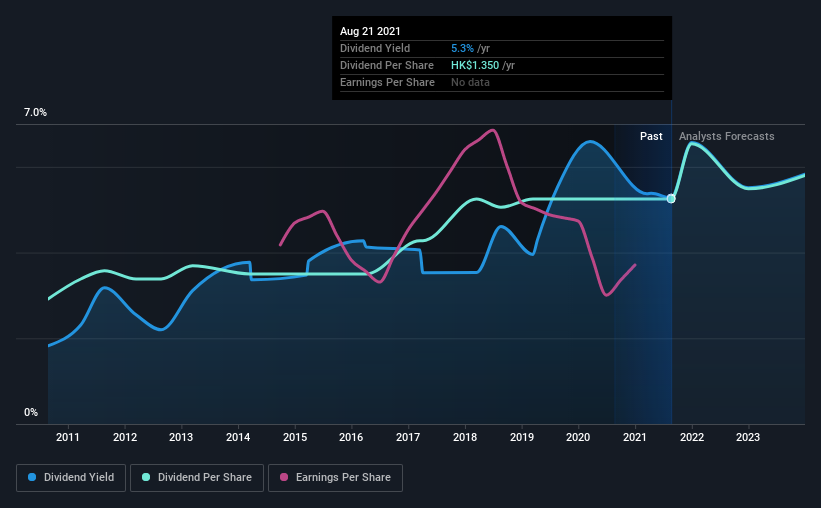Kerry Properties Limited (HKG:683) has announced that it will pay a dividend of HK$0.40 per share on the 17th of September. This means that the annual payment will be 5.3% of the current stock price, which is in line with the average for the industry.
Check out our latest analysis for Kerry Properties
Kerry Properties' Payment Has Solid Earnings Coverage
Unless the payments are sustainable, the dividend yield doesn't mean too much. Before making this announcement, Kerry Properties was easily earning enough to cover the dividend. This means that most of what the business earns is being used to help it grow.
EPS is set to fall by 13.8% over the next 12 months. If the dividend continues along recent trends, we estimate the payout ratio could be 46%, which we consider to be quite comfortable, with most of the company's earnings left over to grow the business in the future.

Kerry Properties Has A Solid Track Record
The company has an extended history of paying stable dividends. The first annual payment during the last 10 years was HK$0.75 in 2011, and the most recent fiscal year payment was HK$1.35. This works out to be a compound annual growth rate (CAGR) of approximately 6.1% a year over that time. The growth of the dividend has been pretty reliable, so we think this can offer investors some nice additional income in their portfolio.
Dividend Growth May Be Hard To Achieve
The company's investors will be pleased to have been receiving dividend income for some time. Unfortunately things aren't as good as they seem. Although it's important to note that Kerry Properties' earnings per share has basically not grown from where it was five years ago, which could erode the purchasing power of the dividend over time.
In Summary
Overall, we think Kerry Properties is a solid choice as a dividend stock, even though the dividend wasn't raised this year. The earnings coverage is acceptable for now, but with earnings on the decline we would definitely keep an eye on the payout ratio. The dividend looks okay, but there have been some issues in the past, so we would be a little bit cautious.
Investors generally tend to favour companies with a consistent, stable dividend policy as opposed to those operating an irregular one. However, there are other things to consider for investors when analysing stock performance. As an example, we've identified 1 warning sign for Kerry Properties that you should be aware of before investing. We have also put together a list of global stocks with a solid dividend.
When trading stocks or any other investment, use the platform considered by many to be the Professional's Gateway to the Worlds Market, Interactive Brokers. You get the lowest-cost* trading on stocks, options, futures, forex, bonds and funds worldwide from a single integrated account. Promoted
Valuation is complex, but we're here to simplify it.
Discover if Kerry Properties might be undervalued or overvalued with our detailed analysis, featuring fair value estimates, potential risks, dividends, insider trades, and its financial condition.
Access Free AnalysisThis article by Simply Wall St is general in nature. We provide commentary based on historical data and analyst forecasts only using an unbiased methodology and our articles are not intended to be financial advice. It does not constitute a recommendation to buy or sell any stock, and does not take account of your objectives, or your financial situation. We aim to bring you long-term focused analysis driven by fundamental data. Note that our analysis may not factor in the latest price-sensitive company announcements or qualitative material. Simply Wall St has no position in any stocks mentioned.
*Interactive Brokers Rated Lowest Cost Broker by StockBrokers.com Annual Online Review 2020
Have feedback on this article? Concerned about the content? Get in touch with us directly. Alternatively, email editorial-team (at) simplywallst.com.
About SEHK:683
Kerry Properties
An investment holding company, engages in the development, investment, management, and trading of properties in Hong Kong, Mainland China, and the Asia Pacific region.
Reasonable growth potential average dividend payer.
Similar Companies
Market Insights
Weekly Picks


Crazy Undervalued 42 Baggers Silver Play (Active & Running Mine)


Fiducian: Compliance Clouds or Value Opportunity?

Willamette Valley Vineyards (WVVI): Not-So-Great Value
Recently Updated Narratives

Watch Pulse Seismic Outperform with 13.6% Revenue Growth in the Coming Years

Significantly undervalued gold explorer in Timmins, finally getting traction

Moderation and Stabilisation: HOLD: Fair Price based on a 4-year Cycle is $12.08
Popular Narratives


MicroVision will explode future revenue by 380.37% with a vision towards success


NVDA: Expanding AI Demand Will Drive Major Data Center Investments Through 2026





